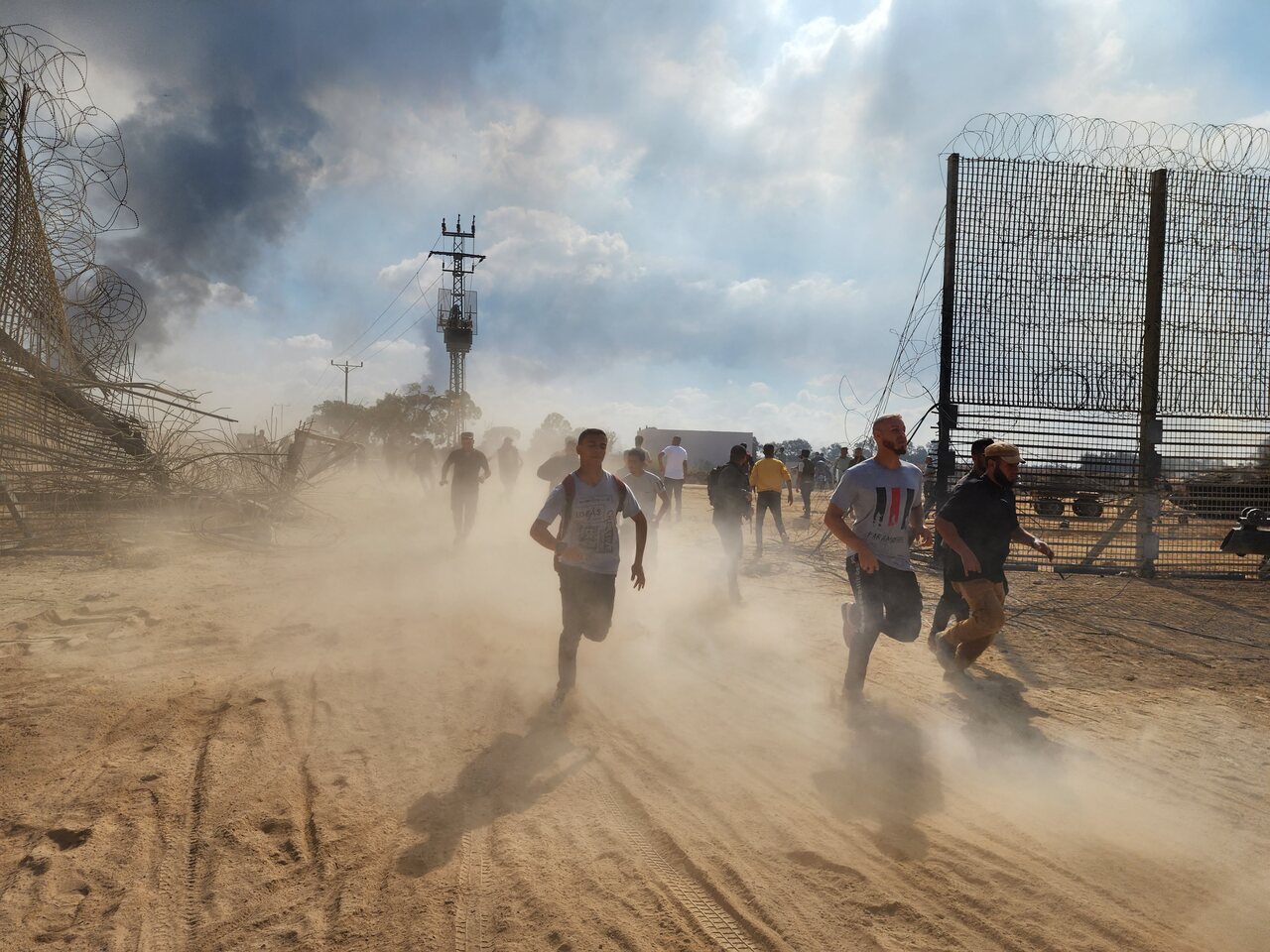International Criminal Court Seeks to Prosecute Israeli and Hamas Leaders
On 21 November, the Pre-Trial Chamber of the International Criminal Court (ICC) issued arrest warrants for Israeli Prime Minister Benjamin Netanyahu and former Defence Minister Yoav Gallant, and Hamas leader Muhammed Deif. The decision is a major political blow to Israel and will deepen its international isolation. Carrying out the order is a highly polarising issue in transatlantic relations and, from the perspective of the countries of the Global South, a test of the credibility of the attitude of Western countries towards the ICC.
.png) AA/ABACA / Abaca Press / Forum
AA/ABACA / Abaca Press / Forum
Background of the Case and the Warrants
Proceedings concerning crimes in Palestinian areas have been pending before the ICC at the initiative of its authorities since 2015. The cases have been dragging on mainly because of the controversy over Palestine’s status as a state, the lack of priority given to it for years by the court, and the ICC’s limited staff and financial resources. The Hamas terrorist attacks of 7 October 2023 and the Israeli military response in Gaza, as well as media and NGO reports of possible crimes by both sides, led some states to expect the ICC to act more decisively. On 17 November 2023, Bangladesh, Bolivia, Djibouti, Comoros, and South Africa referred a case to the ICC, while Chile and Mexico joined on 18 January. These appeals mobilised the current ICC Prosecutor Karim Khan to request the court on 20 May issue arrest warrants for the leaders of the two sides. The ICC issued them on 21 November. The long period between the requests and the issuance of the warrants was influenced by, among other things, Israel’s attempts to legally block the court from issuing them, the large number of legal positions submitted to the ICC by states parties and others on their own initiative, and the resignation of one of the judges hearing Khan’s requests.
On the Israeli side, the warrants cover Prime Minister Benjamin Netanyahu and Yoav Gallant, who served as defence minister until 7 November. According to the ICC, the politicians may be liable for war crimes and crimes against humanity, including the use of starvation of civilians as a method of warfare, failing to counter attacks on civilians, and persecuting Palestinian residents on the basis of political or nationality criteria.
On the Palestinian side, the warrants were originally intended to target three members of Hamas’ top leadership: political leader Ismail Haniyeh, the head of its Gaza structures Yahya Sinwar, and the leader of its armed arm Muhammed al-Masri (Deif). Israel killed the first two in July and in October. It also reported the death of Deif in July, but Hamas disclaimed it. The ICC therefore deemed it appropriate to prosecute him for war crimes and crimes against humanity. These include the murders of hundreds of Israeli civilians on 7 October 2023, the taking of at least 245 hostages and holding them in inhumane conditions, torture, and subjecting some of them to sexual violence.
Effect of the Warrants and International Reaction
The warrants impose a legal obligation on the 125 states party to the ICC’s Rome Statute (including Poland) to arrest and hand over wanted persons to The Hague-based tribunal, and other states can do so voluntarily. This severely restricts the ability of the wanted individuals to travel. Palestine and Israel could ask the ICC to modify or even cancel the warrants if they successfully challenge the court’s jurisdiction or the case’s admissibility. This could be based, for example, on real action to punish the suspects. Under the current political circumstances, however, this can hardly be expected. Hamas disputes the ICC’s accusations and responsibility for the crimes. The Palestinian Authority is silent on the accusations against Hamas, and with no real control over Gaza, it would be incapable of capturing Deif even if alive. Israel, on the other hand, has challenged the ICC’s jurisdiction from the beginning, and as long as Netanyahu remains in power, any action against him is unlikely. According to media reports, investigative and judicial bodies are conducting a small number of investigations into the actions of Israeli soldiers in Gaza, generally for minor crimes (such as theft). The credibility of the Israeli government’s position is made worse by the failure to establish an independent state commission to investigate the circumstances and consequences of the Hamas attack, as well as media reports of the use of intelligence services for surveillance and attempts to torpedo ICC activities. Political pressure on the prosecutor Khan for his resignation for taking steps against Israel is also being exerted by the U.S. However, these are far less hostile than the sanctions that had been imposed in June 2020 on ICC employees and associates, lifted only under the Biden administration in April 2021.
Political and Diplomatic Consequences
The ICC warrants are among the most severe challenges to the Israeli authorities to date and will contribute to their isolation in the international community. Prosecuting the prime minister significantly reduces Israel’s diplomatic ability to maintain direct and overt relations with the leaders of other countries, for whom dealing with Netanyahu would entail image costs. The ability to make official visits without the risk of arrest is limited at this point to a dozen or so closest non-party allies to the Rome Statute, such as Azerbaijan, India, and the U.S.
Most of the ICC’s European members have declared their willingness to implement the order. However, in their statements they also emphasise political considerations, such as criticizing the simultaneous actions against Hamas and Israel (e.g., Czechia). Hungary rejected the decision altogether and Prime Minister Viktor Orbán invited Netanyahu to visit the country. Germany has pledged support for the ICC, but a final decision on executing the warrant is expected only when a visit by the Israelis is realistically likely. Greece and Italy have taken an ambiguous position as well as France, which has changed its initial position accepting the order to indicating now that it may not apply to the Israeli prime minister.
Israel will count on U.S. support in defending against the orders and consequences. The outgoing Biden administration has already criticised the issuance of the warrants on the Israeli politicians. People close to Donald Trump announced a strong response, which means the likely reinstatement of sanctions on ICC employees and diplomatic consequences for states if they attempt to execute the warrants. At the same time, countries of the Global South are ready to arrest the wanted persons and probably will raise the issue of double standards by the West.
The effects of the orders in Israel are twofold. On the one hand, Netanyahu is supported in this instance virtually by the entire political scene. At the same time, in the long term, for example in the context of elections, the warrants may strain the prime minister and his political camp. Further warrants against other Israeli politicians cannot be ruled out, including semi-opposition leader Benjamin Gantz, who was a member of the government coalition from October to April and was complicit in war decisions. To a lesser extent, the warrant for Deif affects Hamas because of his uncertain fate, among other things. Still, the warrant might serve as an important tool against Hamas denialism, reproduced in media or by the organisation’s allies, of crimes committed by its members.
Conclusions
The ICC warrant against Netanyahu is the first of its kind against a democratically elected leader of a state considered to be part of the West. At the international level, attempts by Israel and its allies to discredit the court and its officials are to be expected. After Trump begins his term in January, the U.S. may also pressure allies that are also parties to the Rome Statute to ignore the warrants, for example, by persuading them to hold meetings with the Israeli prime minister on their territory. This would further erode the ICC system and undermine the legitimacy of other warrants, such the one for Vladimir Putin. It is also uncertain whether all states party to the statute will fulfil their obligations.
For Israel, the ad hoc solution remains the establishment of an investigative body with broad oversight powers and the greatest possible degree of independence to assess the authorities’ decisions and the military action in Gaza. This would give it grounds for requesting the ICC to nullify the warrants, albeit with no guarantee of success.
The reactions to the issuing of the warrants also highlight the divisions among European countries, which take extremely different or deliberately unclear positions on the issue, from Hungary and France to Spain or the Netherlands, among others. This will hinder concerted action at the EU level and reduce the effectiveness of policy on the situation in the Palestinian territories. For Poland, the issuing of the warrants creates a potentially difficult situation, especially in the context of the upcoming EU presidency. Poland is an important advocate for the prosecution of international crimes, such as those committed in Ukraine, while at the same time it risks possible actions from the United States, especially the Trump administration, when the matter concerns Netanyahu or Gallant. The failure of Poland or other EU states to detain wanted persons would undermine the credibility of their declarations of respect for international law and commitments to the ICC.






